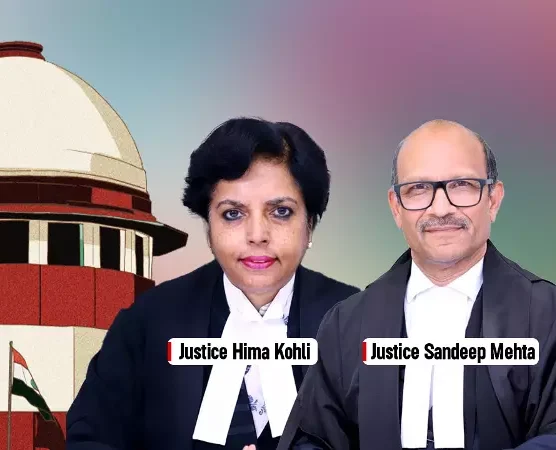The Supreme Court on Wednesday (Aug. 28) set aside the show-cause notices issued by the Canara Bank to certain employees who were appointed under the Scheduled Caste quota based on a valid caste certificate since their caste was de-scheduled from the SC list.
A batch of appeals were filed before the Supreme Court challenging the Karnataka High Court’s decision justifying the Bank’s show cause notice.
The appellants were employed by the Canara Bank in the Scheduled Castes Category based on Caste Certificates, certifying that they belonged to the ‘Kotegara’ community, a synonymous caste which was made equivalent to the caste called ‘Kotegar Matri’ (included in the Scheduled Castes list) by a Government circular dated 21st November 1977 issued by the State of Karnataka.
A Constitution Bench of the Supreme Court in State of Maharashtra v. Milind and Others, held that the State Government has no authority to amend or modify the Scheduled Castes and Scheduled Tribes list published under Articles 341 and 342 of the Constitution of India. Based on this decision, the Ministry of Finance declared the decision of the State to include’Kotegara’ caste in SC list as void.
The Government of Karnataka issued a circular dated 11th March, 2002 providing protection to individuals employed in State services who had obtained Caste Certificates based on a synonymous caste under the Government circulars, issued by the State. These individuals were to be treated as having been appointed under the General Merit(GM) category, effective from 11th March, 2002. The said circular also provided that such candidates would not be eligible for future promotions or any other benefits as SCs/STs, although they could claim benefits under the respective Backward Classes to which they belonged. Although the ‘Kotegara’ community was not included in this circular, a subsequent circular dated 29th March, 2003, the protection of the earlier circular was extended to them as well.
According to the bank/respondent, the petitioners were not entitled to retain their employment pursuant to the de-scheduling of the Caste.
However, it was contended by the Bank that their appointment could not be disturbed pursuant to the State Government circular (approved by the Union Ministry of Finance) which extended the benefit of employment to the Appellants irrespective of the fact that the caste-based on which the appointment was made was de-scheduled later on.
Thus, a common question was decided by the Court i.e., “whether a person who joined the services of a Nationalized Bank/Government of India undertaking based on a certificate that identified him/her as belonging to a Scheduled Caste(‘SC’)/Scheduled Tribe(‘ST’) in the State of Karnataka, pursuant to the State Government’s notifications, would be entitled to retain the position after the caste/tribe has been de-scheduled.”
Answering in affirmative, the bench comprising Justices Hima Kohli and Sandeep Mehta observed that the appellants would be entitled to retain their position even after the de-scheduling of the caste.
The Court noted that the Ministry of Finance, Government of India, while referring to the Government of Karnataka’s circular dated 29th March 2003, clarified and recommended that in cases where a Scheduled Caste employee(s) has been de-scheduled after an appointment in the Bank, the concerned employee(s) may be treated under the General Merit category, and any disciplinary cases pending against him/her should be withdrawn.
The judgment authored by Justice Sandeep Mehta said :
“The circular dated 29th March, 2003 issued by the Government of Karnataka specifically extended protection to various castes, including those which were excluded in the earlier Government circular dated 11th March, 2002. This subsequent circular covered the castes such as Kotegara, Kotekshathriya, Koteyava, Koteyar, Ramakshathriya, Sherugara, and Sarvegara, thus, ensuring that individuals of these castes, holding Scheduled Castes Certificates issued prior to de-scheduling, would be entitled to claim protection of their services albeit as unreserved candidates for all future purposes. Additionally, the communication issued by the Ministry of Finance dated 17th August, 2005 reinforced the protective umbrella to the concerned bank employees and also saved them from departmental and criminal action.”
While holding so, the Court also referred to the observtion in State of Maharashtra v. Milind that the admissions and appointments that have become final need not be disturbed and be given full effect.
“Consequently, we hold that the proposed action of the respondent banks/undertakings in issuing notice(s) to the appellants to show cause as to why their services may not be terminated cannot be sustained and are hereby quashed.”, the Court concluded.
Appearance:
For Petitioner(s) Mr. K.V.Dhananjay, Adv. Mr. A Velan, AOR Ms. Navpreet Kaur, Adv. Mr. Dheeraj SA, Adv. Mr. Vikash Chandra Shukla, AOR Mr. Seetharaman Venkat, Adv. Mr. Aishvary Vikram, Adv. Mr. Tarun Gulia, Adv. Mr. Ajay Awasthi, Adv. Mr. Siddhartha Relan, Adv. Mr. Mukul Rathor, Adv. Mr. Anil Katarki, Adv. Ms. Veena Katarki, Adv. Mr. Anurag Katarki, Adv. Mr. Deva Vrat Anand, Adv. Mr. T. R. B. Sivakumar, AOR
For Respondent(s) Mr. Dhruv Mehta, Sr. Adv. Mr. Rajesh Kumar Gautam, AOR Mr. Anant Gautam, Adv. Ms. Nishi Sangtani, Adv. Mr. Samir Mudgil, Adv. Mr. R.P. Daida, Adv. Ms. Kavitoli G Yeptho, Adv. Ms. Likivi Jakhalu, Adv. Mr. Kushagra Nilesh Sahay, Adv. Mr. Arvind Ray, Adv. Mr. Tridibe Bose, Adv. Mr. Karanveer Singh Anand, Adv. M/S. Khaitan & Co., AOR Mr. Rahul Ranjan Verma, Adv. Ms. Ashmita Bisarya, Adv. Mr. Nirmal Kumar Ambastha, AOR Mr. D. L. Chidananda, AOR Mr. Nishant Patil, A.A.G. Mr. Vignesh Adithiya S, Adv. Mr. Ayush P Shah, Adv. Mr. V. N. Raghupathy, AOR
Case Title: K. NIRMALA & ORS. VERSUS CANARA BANK & ANR., C.A. No. 009916 – 009920 / 2024
Citation : 2024 LiveLaw (SC) 618
#airr #news #airrnews #channel #Legal #case #India #court #highcourt #supremecourt




